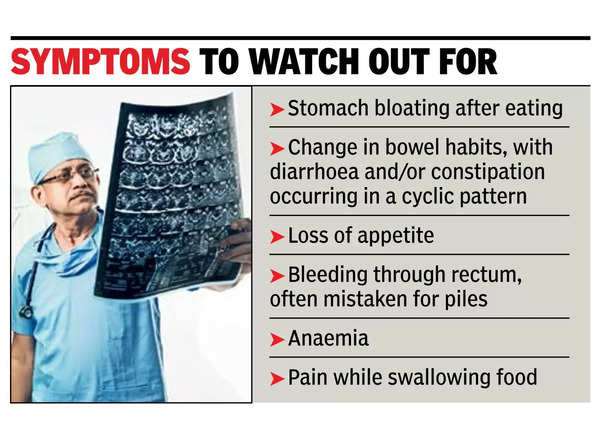
Chandigarh: With the incidence of gastrointestinal (GI) cancers in India increasing, healthcare professionals in PGI have emphasised early detection, lifestyle changes and stress management as crucial preventive measures. “The rise is particularly linked to conditions such as Irritable Bowel Syndrome (IBS), which has emerged as a notable risk factor for GI cancers, especially amongst individuals with Type A personality traits,” said Prof Rakesh Kapoor, unit head, department of radiation oncology, PGI.
Individuals with Type A personalities, characterised by their ambitious nature, perfectionist tendencies and resilience under pressure, show higher susceptibility to digestive disorders, including IBS. Their typically stressful and rushed lifestyle significantly impacts digestive health, potentially leading to chronic conditions. Research indicates that sustained stress can cause gut inflammation, impair digestion and elevate the likelihood of developing gastrointestinal cancers, which constitute approximately 25% of global cancer cases.

Lifestyle adjustments can help prevent 50% of GI cancers. Studies highlight the significance of dietary habits, stress management and mindfulness in risk reduction. “Proper eating posture notably influences digestion. Yoga practitioners have shown us that sitting while eating enables better food retention in the stomach, allowing digestive enzymes to function optimally. Conversely, eating while standing or hurriedly can hamper digestion and affect gut bacteria balance, potentially increasing cancer risks,” said Prof Kapoor.
Escalation in GI cancer incidents correlates with contemporary dietary practices, including increased consumption of processed foods, fast food, alcohol and tobacco use. “This trend particularly affects individuals born in the 1990s, who are experiencing a substantial rise in GI-related conditions due to altered food preparation and consumption patterns,” said Prof Kapoor.
Experts believe mental clarity and balance are fundamental for proper digestion. “Certain foods, particularly red meat, are considered detrimental to the mind-body harmony and may worsen IBS symptoms. GI cancer patients often find that following a clean, conscious diet serves both physical and spiritual purposes,” said Dr Divya Khosla, department of radiation oncology, PGI.
We also published the following articles recently
India is witnessing an alarming rise in lifestyle-related cancers. Smoking and alcohol consumption are major culprits, contributing to a significant percentage of cases. However, adopting a healthy lifestyle can substantially mitigate these risks. A balanced diet rich in fruits, vegetables, and whole grains, along with regular exercise, stress management, and avoiding tobacco and alcohol, can significantly reduce cancer risks.
Dr. Adarsh Hegde, a renowned radiation oncologist, emphasizes the importance of proactive measures to combat prostate cancer. He highlights the significance of a balanced diet rich in leafy greens, berries, and fatty fish, while limiting processed foods and sugary drinks.


















